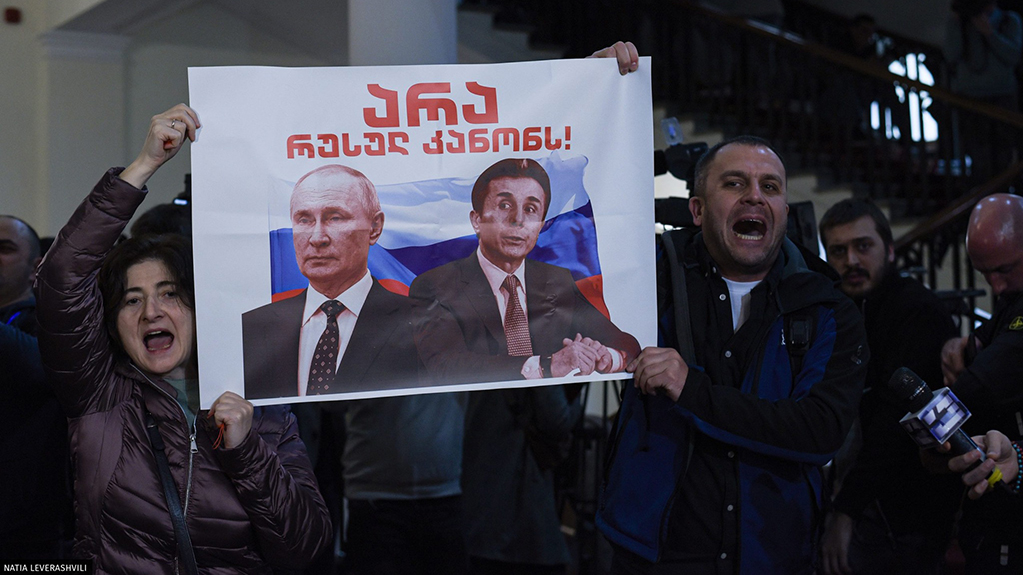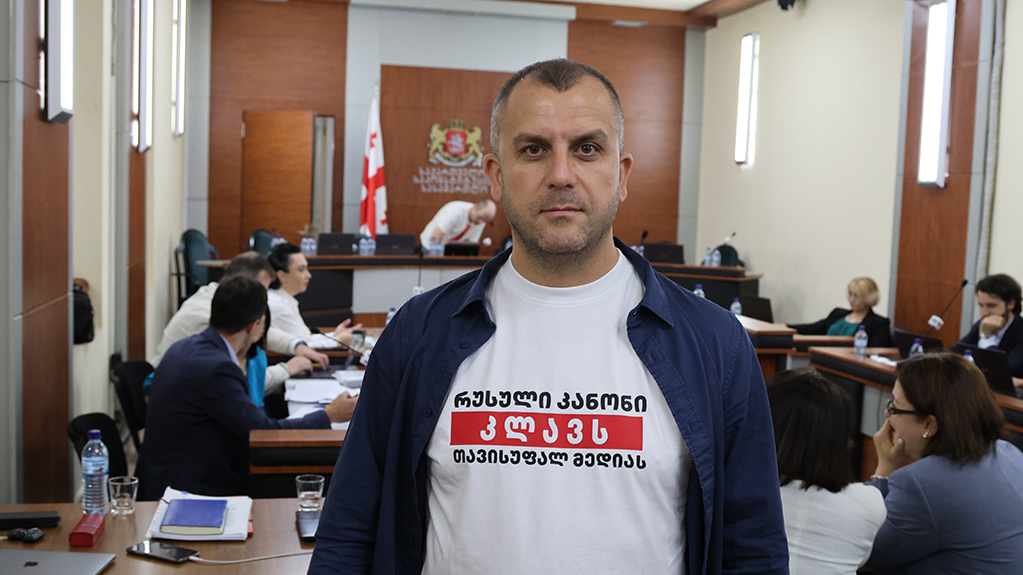The European Court of Human Rights has assigned a case number to the complaint filed by journalist Gela Mtivlishvili, An editor-in-chief of Mtis Ambebi / Georgian News. The Court has informed the applicant that it will consider the case as soon as possible. Mtivlishvili accuses the Georgian government of violating four articles of the European Convention on Human Rights. The case relates to the illegal arrest and trial of the journalist on January 23, 2024. Legal assistance is being provided to the injured journalist by the Center for Social Justice.
News
Right to Freedom And Security
Gela Mtivlishvili asserts that his arrest by the police and subsequent detention for 6 hours at the police station were illegal and arbitrary. He claims that the national courts failed to fulfill their obligation to review the legality of his arrest, thus violating the requirements set out in Article 5, Paragraph 1 of the Convention.
As per the practice established by the European Court of Human Rights, Article 5 guarantees the fundamental right to personal freedom and protection against arbitrary interference by the state. This protection extends even to brief deprivations of liberty, such as when an individual is held at a police station for less than 45 minutes.
The complainant emphasizes that during the eviction of the Khatiashvili family, he did not participate in the demonstration as a protester nor cause any disturbances. Instead, he arrived as a journalist to cover the ongoing situation. Upon reaching the demonstration, he stood on the sidewalk in front of the building while the police were arresting someone. This is confirmed by footage from his own mobile phone, as well as video surveillance footage from the special investigation service and witness testimony. It should be noted that video recording of potential excessive force at public demonstrations is a vital right of journalistic activity. Furthermore, the applicant did not interfere with the police officers’ actions nor engage with them verbally, as indicated in the administrative offense protocol. While filming the arrest, he maintained a distance of several meters from the police. Additionally, the police officers did not issue any warnings or orders, but immediately proceeded to arrest him.
When the police officers detained Mtivlishvili by force, he informed them three times that he was a journalist and cautioned them not to impede his professional duties.
The administrative offense protocol was drawn up on January 25, 2024, 2 days after his arrest. The authorities could not provide any justification for why the protocol was not prepared at the time of the incident. In the cases of Navalny and Yashin v. Russia and Novikova and others v. Russia, the European Court of Human Rights ruled that if the authorities fail to present valid reasons for not drawing up the protocol on the spot, the arrest and transfer to the police station constitute an arbitrary and illegal restriction of freedom.
During the court hearing, no evidence was presented to substantiate the government’s claim that Gela Mtivlishvili disrupted public order, used offensive language, or disobeyed lawful police orders.
The complainant argues that the national courts did not ensure an effective review of the legality of his detention and approached the matter in a formalistic manner. The European Court has previously criticized this approach in the case of Dzerkorashvili and others v. Georgia.
Right to A Fair Trial
The applicant argues that the administrative proceedings against him, which, under Article 6 of the Convention, have the character of criminal proceedings, were unfair because the domestic courts violated the principle of equality of arms. Specifically, they unjustifiably favored the testimony of the police officer over his evidence and placed the burden of proof on him.
The administrative offense for which the journalist was convicted carries a penalty of a fine ranging from 2000 to 3000 GEL and up to 15 days of administrative detention. Given the European Court’s approach in similar cases (e.g., Mikhailova v. Russia; Kasparov and others v. Russia), the offense under Article 173 of the Code of Administrative Offenses should be classified as a "criminal law" offense due to its general nature, the punitive and deterrent purpose of the sanction, and the fact that it is punishable by imprisonment, which is characteristic of criminal law.
The European Court has established that when national courts fail to examine the "lawfulness" of a police order and punish individuals for conduct protected by the Convention without requiring the police to justify their intervention, this contravenes fundamental principles of criminal law (Nemtsov, Navalny and Yashin v. Russia).
In this case, the local courts relied solely on the testimony of the arresting police officer, as well as the administrative offense and arrest protocols they had drawn up and signed, despite the fact that the police officers had a direct interest in the applicant’s conviction. As a result, the court placed the burden of proof on the appellant to prove his innocence in the criminal trial. The appeals court ignored the petitioner’s request to examine video surveillance footage that would have proven his innocence. In this regard, the European Court stresses that it is the Court’s role to assess whether the proceedings, as a whole, were fair, as required by Article 6 § 1 of the Convention (Frumkin v. Russia). Furthermore, when the only evidence against the applicant is provided by police officers who were actively involved in the disputed events, it is essential that the domestic courts exhaust all reasonable possibilities to investigate their incriminating statements (Kasparov and others v. Russia).
Additionally, the petitioner asserts that the court's conclusion was criticized by the Supreme Court of Georgia in its decision of April 2, 2013, which emphasized that giving preference to the testimony of police officers violates the fundamental principles of impartiality and equality of the parties.
Freedom of Expression
Complainant Gela Mtivlishvili argues that his right to freedom of expression under Article 10 of the Convention was violated when the police forcibly removed him from the protest, detained him for over 6 hours, and when the courts found him guilty of an administrative offense and imposed a fine of 2000 GEL. He asserts that the intervention was illegal and arbitrary, not based on a legitimate aim, as he did not commit the administrative offense of disobeying a police order. The local courts failed to provide sufficient reasoning to demonstrate that his arrest and conviction were necessary in a democratic society, and thus cannot justify the interference with journalistic activities.
The European Court of Human Rights has held in similar cases that, given the essential role the media plays in a democratic society, any attempt to remove journalists from the site of demonstrations should be subject to "strict scrutiny" (Selman et al. v. The former Yugoslav Republic of Macedonia; Butkevich v. Russia).
Scope of Application of Rights Restrictions
The applicant claims that his administrative detention and fine for an offense he did not commit were intended to punish and silence him for his journalistic activities, in violation of Article 18, read in conjunction with Articles 5 and 10 of the Convention.
The applicant argues that his imprisonment was motivated by an ulterior purpose, stemming from his apparently arbitrary arrest and the ill-treatment he endured by police officers in the police car.
These facts are particularly significant in light of the contextual factors of this case, including the continuous verbal attacks and threats made by the Speaker of Parliament, Shalva Papuashvili, and Prime Minister Irakli Kobakhidze against the applicant. They referred to him as an "agent" in a negative context, at the behest of the ruling party’s deputy, Dimitri Samkharadze.

The applicant contends that his case cannot be considered in isolation and draws the court’s attention to the growing trend of repression against civil activists, opposition leaders, and journalists who express dissent or criticize the government. The applicant also emphasizes the need for the court to consider the strict and restrictive Russian Law on the activities and funding of non-governmental and media organizations, as well as the subsequent attacks against opponents of the ruling party. These attacks have been directed at non-governmental organizations, critical media outlets, journalists, and civil society workers. Among them, the petitioner is portrayed as an enemy of the nation, a traitor, and a foreign agent. These accusations are voiced by the country’s highest political officials and spread through an organized and well-coordinated campaign. According to the complaint, these facts, together with the statements made by the country’s officials, support the applicant’s claim that his arrest, mistreatment by the police, verbal threats, and discrediting over several months were part of a larger effort to silence independent media and restrict freedom of speech in Georgia.
At the trial in Tbilisi City Court, arresting officer Anri Pkhakadze accused journalist Gela Mtivlishvili of cursing at the police, calling them slaves, interfering with their work, and attempting to snatch one of the arrested individuals from the officers. However, continuous footage from the video surveillance system on Kekelidze Street, provided by the Special Investigation Service, proves that the journalist had neither physical nor verbal interaction with the police. He was arrested upon arrival. The prosecutor's office recognized Gela Mtivlishvili as a victim in the case of his arrest in July, yet no police officer has been held criminally accountable. On the contrary, one of the officers involved was promoted and appointed as the head of the division.















